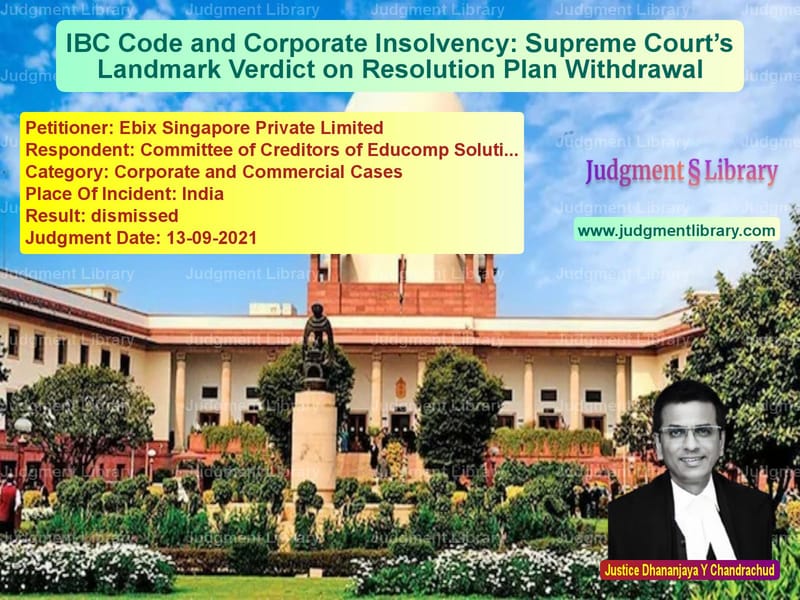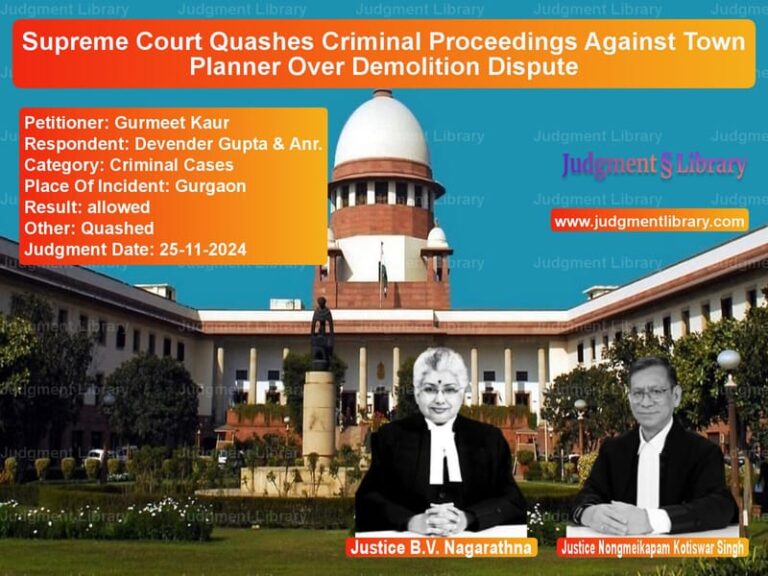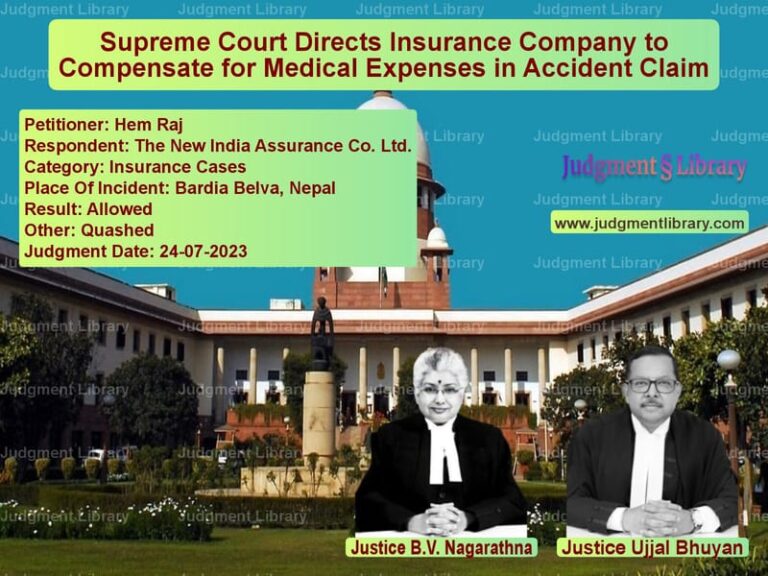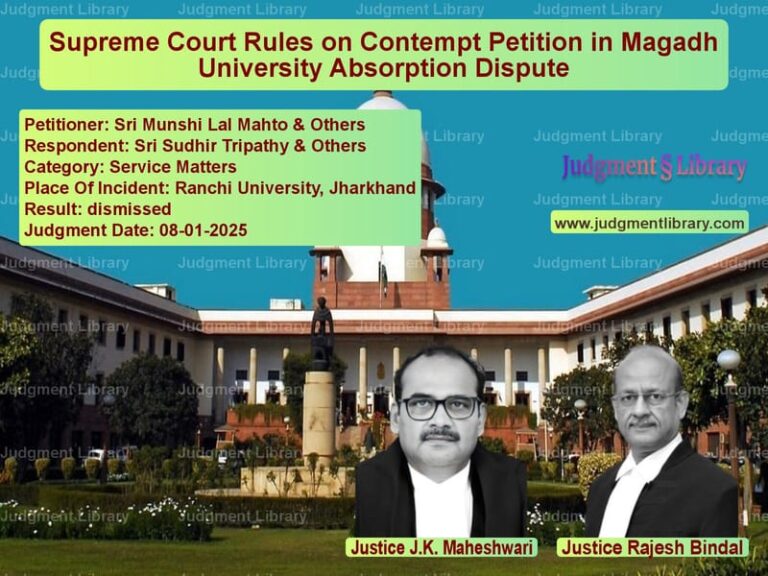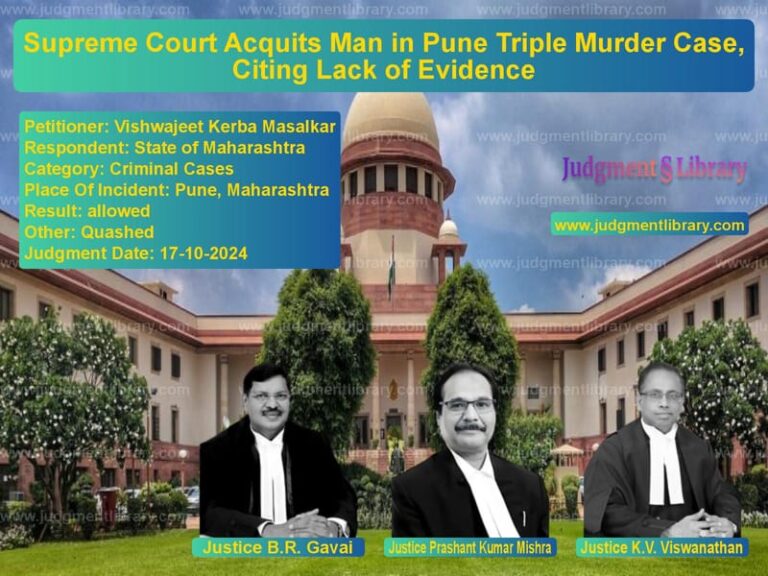IBC Code and Corporate Insolvency: Supreme Court’s Landmark Verdict on Resolution Plan Withdrawal
The Indian legal landscape has undergone significant evolution with respect to corporate insolvency and bankruptcy proceedings. The Insolvency and Bankruptcy Code (IBC), 2016, was introduced to streamline insolvency resolution and ensure that financially distressed companies either undergo revival or liquidation in a time-bound manner. This blog post examines a landmark judgment that discusses the interplay of the IBC and the evolving jurisprudence surrounding resolution plans, bidders’ rights, and the regulatory framework governing corporate insolvency.
The case in focus is Ebix Singapore Private Limited vs. Committee of Creditors of Educomp Solutions Limited & Anr., where the Supreme Court was asked to determine whether a successful resolution applicant can withdraw a resolution plan after it has been approved by the Committee of Creditors (CoC) but before the adjudicating authority grants final approval.
Background of the Case
The dispute arose when Ebix Singapore Private Limited submitted a resolution plan to acquire Educomp Solutions Limited, a company undergoing insolvency proceedings. The resolution plan was approved by the CoC, but before it could be formally ratified by the National Company Law Tribunal (NCLT), Ebix sought to withdraw its plan, citing commercial impracticality due to delays in approval and changing financial circumstances.
The Committee of Creditors (CoC) and the Resolution Professional (RP) objected, arguing that allowing withdrawal at such a stage would set a dangerous precedent and undermine the entire insolvency resolution process.
Legal Issues Raised
- Whether a successful resolution applicant can withdraw a resolution plan after CoC approval but before NCLT approval.
- Whether withdrawal is permissible under the IBC framework.
- What impact such withdrawals would have on the overall corporate insolvency resolution process (CIRP).
Petitioner’s Arguments (Ebix Singapore Private Limited)
The appellant put forth the following arguments:
- The resolution plan was binding only after the adjudicating authority approved it under Section 31 of the IBC.
- There was no statutory provision preventing a resolution applicant from withdrawing its plan before NCLT’s final approval.
- Significant commercial and financial changes had occurred during the delay in approval, making the resolution plan commercially unviable.
- It contended that forcing an unwilling applicant to implement an outdated plan would be contrary to the objectives of the IBC.
Respondent’s Arguments (Committee of Creditors & Resolution Professional)
The respondents countered with the following arguments:
- Allowing a resolution applicant to withdraw after CoC approval would jeopardize the CIRP framework and undermine confidence in the process.
- The IBC’s purpose is to ensure predictability and certainty in insolvency resolution.
- The principle of estoppel should apply, preventing a successful bidder from reneging after securing CoC approval.
- Any withdrawal would force the company into liquidation, leading to significant losses for creditors, employees, and stakeholders.
Supreme Court’s Judgment
The Supreme Court delivered a landmark judgment dismissing the appeal by Ebix and holding that resolution plans, once approved by the CoC, create binding obligations on the resolution applicant. The key observations made by the Court were:
Read also: https://judgmentlibrary.com/tenant-rights-vs-secured-creditors-supreme-court-rules-on-sarfaesi-act/
“The IBC framework aims to ensure predictability, efficiency, and timely resolution of insolvency proceedings. Allowing withdrawals post-CoC approval would create uncertainty and discourage bidders from taking the process seriously.”
“Once a resolution plan is approved by the CoC, it cannot be withdrawn merely because the resolution applicant finds it commercially inconvenient to proceed with implementation.”
The Court ruled that there is no explicit provision in the IBC that allows a successful resolution applicant to withdraw a resolution plan once it has been approved by the CoC.
Key Takeaways from the Judgment
- Resolution applicants must conduct thorough due diligence before submitting a bid, as they cannot withdraw once their plan is approved.
- The judgment reinforces the integrity of the IBC process by preventing strategic withdrawals.
- CoC approval of a resolution plan creates legal obligations, ensuring certainty in the insolvency resolution process.
- The ruling prevents unnecessary delays and protects the interests of creditors and other stakeholders.
Impact of the Judgment
- Strengthens the IBC framework by making resolution plans binding post-CoC approval.
- Ensures stability in the corporate insolvency resolution process.
- Discourages frivolous bidding and ensures that only serious resolution applicants participate.
- Protects creditors from financial losses caused by unexpected withdrawals.
Conclusion
The Supreme Court’s ruling in Ebix Singapore Private Limited vs. Committee of Creditors of Educomp Solutions Limited & Anr. is a landmark decision in Indian insolvency law. It ensures that once a resolution plan is approved by the CoC, it cannot be withdrawn arbitrarily by the resolution applicant. The judgment upholds the integrity of the IBC process and ensures that insolvency resolution remains stable, efficient, and predictable.
Petitioner Name: Ebix Singapore Private Limited.Respondent Name: Committee of Creditors of Educomp Solutions Limited & Anr..Judgment By: Justice Dhananjaya Y Chandrachud.Place Of Incident: India.Judgment Date: 13-09-2021.
Don’t miss out on the full details! Download the complete judgment in PDF format below and gain valuable insights instantly!
Download Judgment: ebix-singapore-priva-vs-committee-of-credito-supreme-court-of-india-judgment-dated-13-09-2021.pdf
Directly Download Judgment: Directly download this Judgment
See all petitions in Bankruptcy and Insolvency
See all petitions in Corporate Governance
See all petitions in Company Law
See all petitions in unfair trade practices
See all petitions in Judgment by Dhananjaya Y Chandrachud
See all petitions in dismissed
See all petitions in supreme court of India judgments September 2021
See all petitions in 2021 judgments
See all posts in Corporate and Commercial Cases Category
See all allowed petitions in Corporate and Commercial Cases Category
See all Dismissed petitions in Corporate and Commercial Cases Category
See all partially allowed petitions in Corporate and Commercial Cases Category

